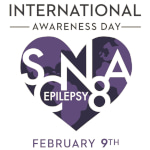International SCN8A Awareness Day Date in the current year: February 9, 2026
 International SCN8A Awareness Day is held annually on February 9 to raise awareness of a rare genetic disorder that affects only a few hundred people worldwide and causes developmental delay, severe epilepsy, and other health problems.
International SCN8A Awareness Day is held annually on February 9 to raise awareness of a rare genetic disorder that affects only a few hundred people worldwide and causes developmental delay, severe epilepsy, and other health problems.The SCN8A gene encodes a voltage-gated sodium channel (sodium channel protein type 8 subunit alpha) that affects the functioning of the nervous system. Mutations in this gene can cause learning difficulties, epilepsy, and other neurological problems. These mutations can be de novo, meaning that they occur spontaneously, or they can be inherited from a parent.
SCN8A-related epilepsy is often resistant to treatment; patients with SCN8A mutations may have daily seizures and require frequent hospitalization. Non-seizure symptoms often include developmental delay, learning difficulties, low or high muscle tone, muscle spasms, poor coordination, and ASD (autism spectrum disorder). Many children with SCN8A struggle with speech development, and some require feeding tubes to get the nutrients they need to grow.
Because SCN8A is very rare (only about 550 patients have been diagnosed since the discovery of the role of SCN8A in the human brain in 2012), there is no standard treatment protocol, especially considering that SCN8A epilepsy is often treatment resistant. Treatment is symptomatic and depends on the type and severity of symptoms.
International SCN8A Awareness Day was launched in 2017 by several organizations for families affected by SCN8A-related disorders: Ajude o Rafa, The Cute Syndrome Foundation, and Wishes for Elliott (currently known as Decoding Developmental Epilepsies). Its primary goal is to raise public awareness of SCN8A and to highlight the importance of SCN8A research and support for families affected by this rare disorder.
The date of February 9 was chosen to commemorate the birthday of Shay Hammer. Her father, population geneticist Michael Hammer, was the first to identify the SCN8A gene as the cause of her epilepsy. Tragically, this discovery came just weeks after Shay’s sudden and unexpected death in 2011 at the age of 15 – the first documented case of sudden unexpected death in epilepsy (SUDEP) in a child with an SCN8A mutation.
Since his daughter’s death, Hammer has dedicated his professional and personal life to advancing the scientific understanding of SCN8A and developing an online registry for children affected by this devastating disorder. The registry contains medical and genetic information about SCN8A patients that can be used by researchers to accelerate progress in the study of SCN8A-related disorders.
Since its second year, each International SCN8A Awareness Day has had a unique theme. Past themes have included “Keep Moving Forward”, “We Choose Hope”, “Stronger Together”, “Against All Odds”, “Our Cute Story”, “Celebrate Today”, “If You Only Knew”, and “I Am”.
There are many ways to get involved with International SCN8A Awareness Day. You can learn more about this rare disorder and share what you’ve learned with others to raise awareness, donate to an organization that supports SCN8A patients or funds research, and spread the word on social media using the hashtag #scn8aawarenessday.
- Category
- International Observances
- Tags
- International SCN8A Awareness Day, international observances, awareness days, rare diseases, genetic conditions